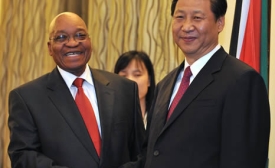africa
President Barack Obama announced that the U.S. Agency for International Development (USAID) will invest more than $38 million toward four regional Leadership Centers that will train thousands of Africa’s emerging leaders and foster connections, creativity, and collaboration in sectors critical to Africa’s growth and development, according to USAID.
The UK is set to spend £2m on medical support and supplies to tackle the spread of Ebola in West Africa, the International Development Secretary Justine Greening announced today. ‘This Ebola outbreak poses a serious public health risk to West Africa,’ she said.
What do the U.S., Argentina, Afghanistan, and Myanmar have in common? This summer, two opportunities enabled me to explore this question from my perspective as an American violinist who recently moved to Argentina from Afghanistan.
President Barack Obama said the U.S. is expanding an initiative to develop and train political and economic leaders in Africa. Obama is expanding a U.S.-based program for young African leaders, and the U.S. Agency for International Development is providing $38 million to create leadership centers in Ghana, Kenya, South Africa and Senegal.
The new battle for Africa does not deploy strong-arm tactics, it is now a soft power game: economic and humanitarian aid, interest-free loans, preferential trade agreements and investments in infrastructure are currency across a continent that is, for the world's established and emerging powers, seemingly up for grabs.
This summer, 500 Africans studied business, leadership and public management on American campuses as part of a new State Department program. The Obama administration has hailed the effort, which is part of the larger Young African Leaders Initiative, as a fresh take on public diplomacy.
China’s increasing involvement in Africa has captured considerable attention from policymakers and academics. Formalized in a 2006 policy statement, “China’s Africa Policy,” Beijing’s interest in the region translates into Chinese government and government-affiliated institutions investing billions of dollars in large-scale construction projects across the continent.

A review of Howard French's book: China’s Second Continent: How a Million Migrants Are Building a New Empire in Africa.







